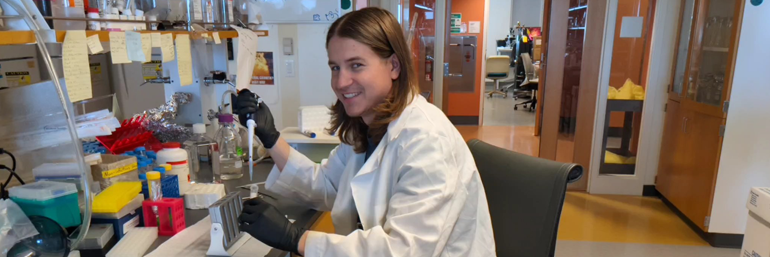Sep 27

NIH Predoctoral Fellowship Awarded to Integrated Pharmaceutical Medicine Student
He’s the first!
Cody Juguilon, a Ph.D. candidate in the Integrated Pharmaceutical Medicine (IPM) graduate program at Northeast Ohio Medical University, has been awarded with a highly competitive NIH predoctoral fellowship known as an F31 grant.
“This is a tremendous accomplishment representing a culmination of effort – and to sweeten the deal, Cody is our first IPM student to receive such award,” said Matthew Smith, Ph.D., co-director of the IPM program, an interprofessional program bridging pharmaceutical and medical sciences. The program aims to train the next generation of leading scientists – a group who will hold a unique perspective on disease mechanisms and targets to advance therapeutic interventions in human health and disease.
“The F31 is a prestigious and very competitive fellowship. Cody is a self-motivated, hardworking, thoughtful student and the award is well-deserved,” said Liya Yin, M.D., Ph.D., an associate professor of integrative medical sciences (IMS), who is Juguilon’s advisor.
Juguilon came to the IPM program with a B.S. in biotechnology from Kent State University. Now in his fifth year in the IPM program, Juguilon works in the lab of Dr. Yin, who won the NEOMED Outstanding Faculty Research Award in 2020.
Harnessing the power of cross-specialty collaboration
Titled “The Role of MicroRNA-21 in Regulating the Coronary Microcirculation in Diabetes,” the goal of the study for which Juguilon was funded is to better understand the impairments in coronary microvascular function that are commonly found in diabetes and linked to cardiac dysfunction.
Students in the IPM program have the opportunity to collaborate with specialists in different research areas – in Juguilon’s case, diabetes and cardiovascular disease. Under the mentorship of Dr. Yin and William Chilian, Ph.D., the IMS chair and the director of NEOMED’s Heart and Blood Vessel Disease research focus area, Juguilon will uncover and describe the mechanisms underlying these impairments.
Ultimately, “the goal of this research is to lead to novel preventions or treatments to improve coronary microvascular function in people with diabetes,” said Juguilon.
“In addition to promoting scientific discovery, Cody’s F31 grant will support his transition into a productive, independent investigator capable of conducting effective translational research in cardiovascular disease, and we look forward to bearing witness to all that Cody will accomplish in the future,” said Dr. Smith.

